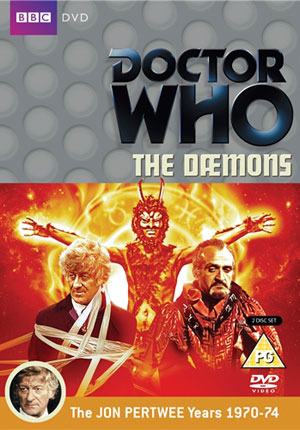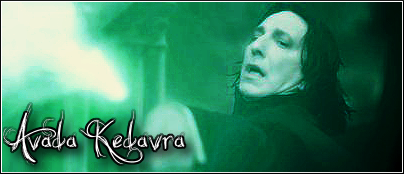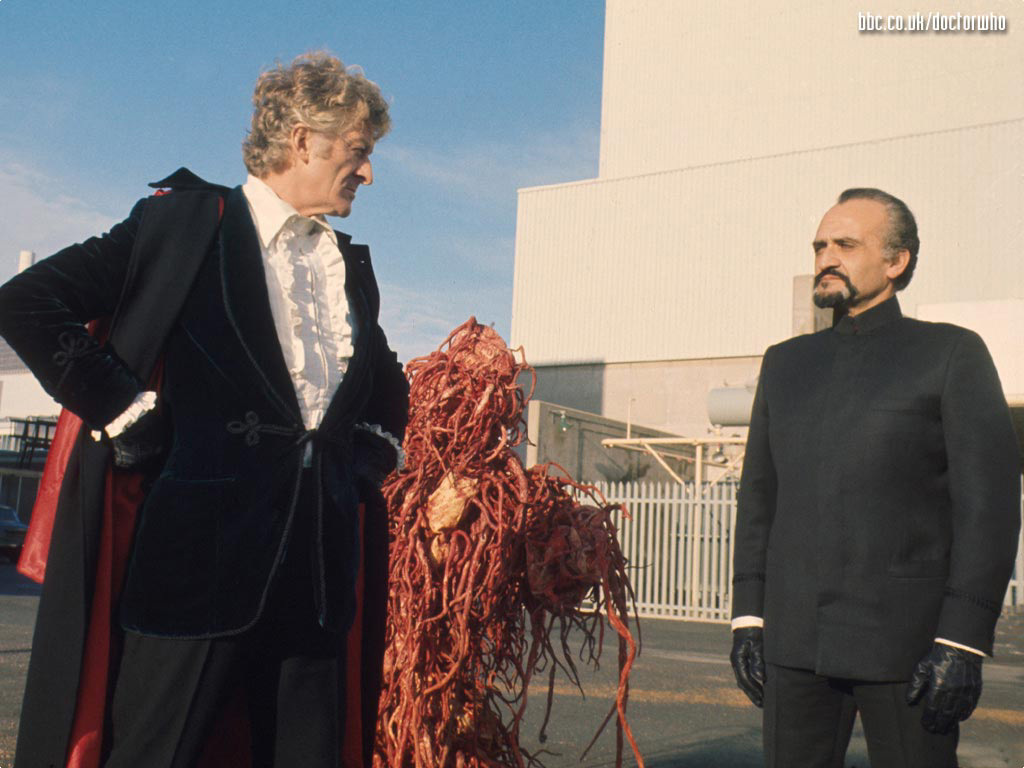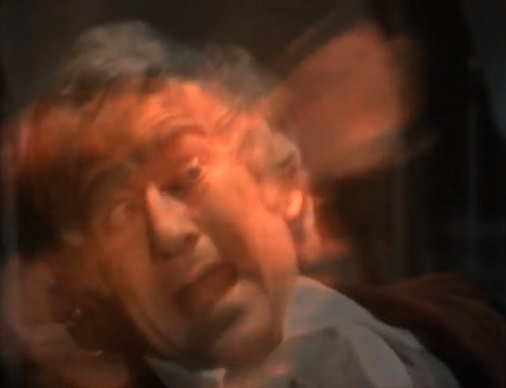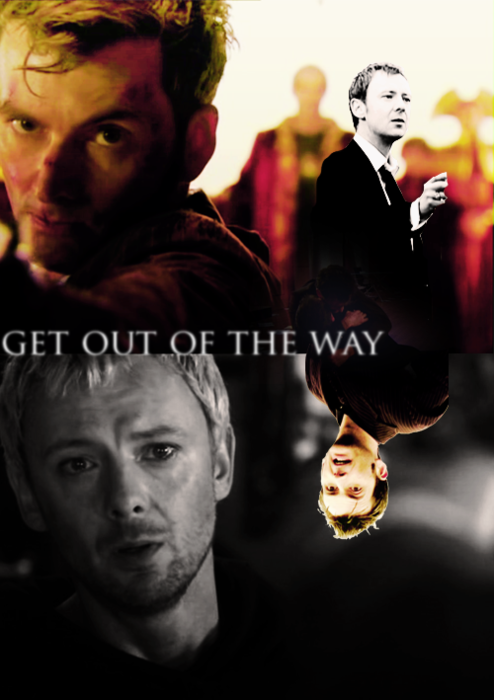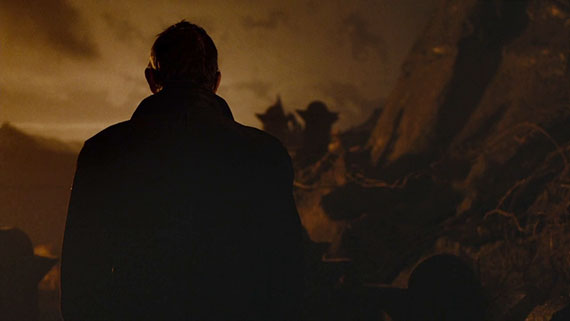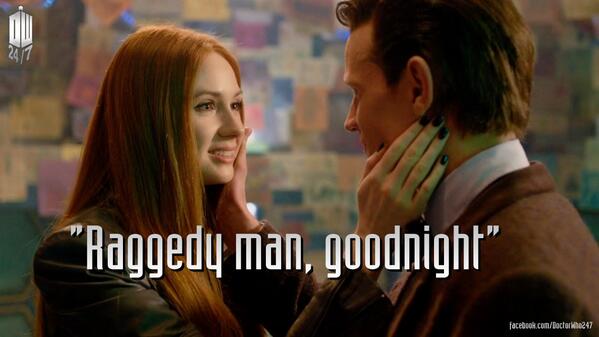We interrupt your regularly scheduled programming to give you this special report.
Nah, I just rewatched the whole "of the Doctor" trilogy (+minisode) and felt the need to write an article about my headcanons and otherwise crazy theories. See, I like to philosophize (if rambling can be called that) about Pertwee, but this is even more in my league, being mostly a NuWho fan.
The End of the Doctor
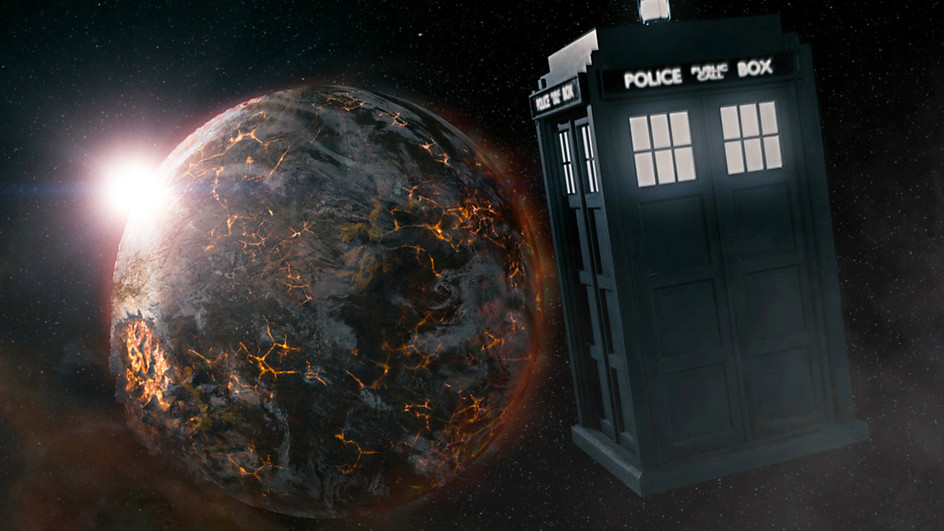
The 50th Anniversary trilogy is all about the Doctor. His life, his death, his biggest (and worst) day. It's about fundamentally changing something about the Doctor, setting right what is wrong in his life. I'd like to posit that if this trilogy had not happened and these changes had not been made, the Doctor would have died for good as he sees in
Name of the Doctor, in battle among millions on a burned planet as a tired and regretful old man. This trilogy is moving the Doctor past these problems, setting the him up for the next 50 years.
The Name of the Doctor
The name of the Doctor is all about who the Doctor is. It's in the title, the Name of the Doctor. It is about the path that has led him to this point in his life, and will lead him to his final death. It's about what he has become along the way from Gallifrey to Trenzalore.
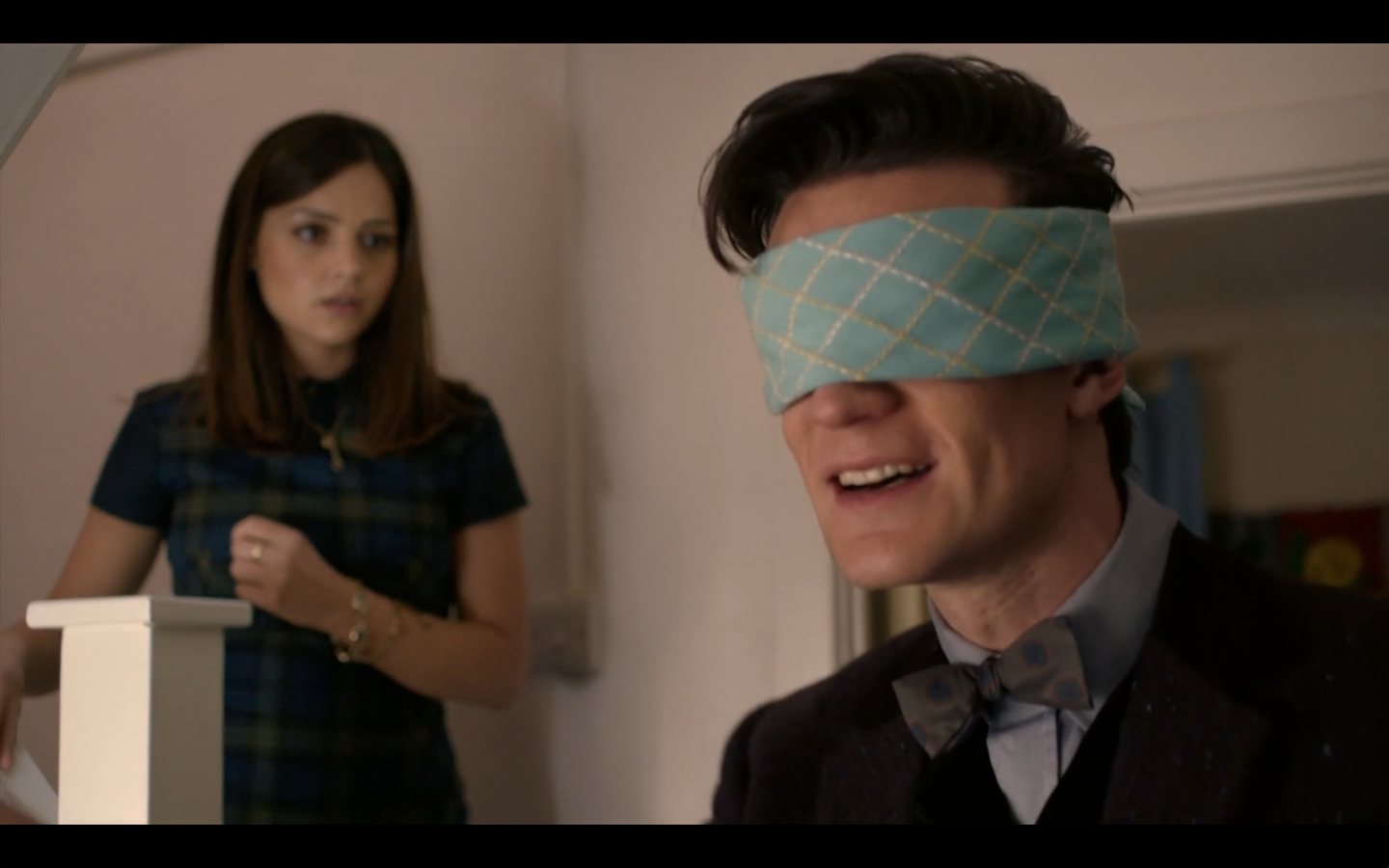
The Doctor enters the Name of the Doctor playing a game with Clara's children. He's been tricked into letting them go to the cinema, and is a bit peeved about it. It's very much an ordinary day for the Doctor, goofing around with children, visiting Clara, probably seeing another blackened attempt at a souffle in the kitchen.
But by the end of the episode, it becomes very clear that the Doctor, even when he's pretending to be happy and playing with kids and kissing his wife, is headed down a dark path that he can't escape from. He's hurtling not only towards his final death (this being his last incarnation) but also towards a more evil side of him.
 |
How much more awesome is this
guy as the GI than as the Doctor? |
It's interesting that the Great Intelligence, who has basically devoted his life to killing people and trying to take over worlds uses these words to describe the Doctor: "Welcome to the final resting of the cruel tyrant. Of the slaughterer of the ten billion. And the vessel of the final darkness. Welcome to the tomb of the Doctor!" and "Tell that to the leader of the Sycorax. Or Solomon the Trader. Or the Cybermen, or the Daleks. The Doctor lives his life in darker hues, day upon day. And he will have other names before the end. Storm. The Beast. The Valeyard."

But as the Great Intelligence is not so much a character as information ("I am information") with a bit of ambition tacked on, we can assume that he's not lying to suit himself and is actually stating factual information about the future of the Doctor. And from everything we as the audience know about the Doctor, he is completely accurate. He mentions the Valeyard (
Trial of a Time Lord confirms that this is in the Doctor's future), Soloman the Trader (obviously he's somewhat omniscient if he knows about that), the leader of the Sycorax (same), and of course, the Cybermen and the Daleks.
So this is an accurate, and perhaps slightly dramatic (isn't Richard E. Grant wonderful?), picture of what the Doctor has coming in his life. His whole life is only leading him into darkness.
But why? Well, we get an answer to that too in the final moments of Name of the Doctor. We never do find out what his name is, but we get this:
"My name, my real name, that is not the point. The name you choose, it's like a promise you make. He's the one who broke the promise. He is my secret."
The War Doctor is standing at the bottom of the Doctor's time stream, not a ghost like all the others, but able to interact with the Doctor. [headcanon] I like to think that this is due to the timey-wimey (he would say timey-what?) nature of the Time War, given that it was mostly fought in the Time Vortex, the War Doctor probably spent a lot of time in his timestream) [/headcanon].
"What I did, I did without choice, in the name of peace and sanity."
"But not in the name of the Doctor."

The Doctor's greatest secret, the one that will ultimately lead him into becoming Storm (possibly already has, the Oncoming Storm?), the Beast, and the Valeyard, is who he was in the time war, and what ending the time war has turned him into. With the weight of 2.47 billion children on his shoulders, the Doctor was never going to find peace. He was never going to go back to just traveling around the universe exploring like he had before the war. He was going to die alone and in battle, because he was never really able to escape the fact that he broke the promise; he couldn't fully go back to being the Doctor after being the warrior for so long.
The Day of the Doctor
Which brings us into the Day of the Doctor. This episode continues the idea that destroying Gallifrey has turned the Doctor into something that he does not want to become and will ultimately lead to his end. It's set at an interesting place in each Doctor's timeline, because each Doctor is at a unique spot to appreciate what the Time War has turned him into.
War: The War Doctor is still fighting in the Time War. He's about to use the Moment, and has declared, "No more." He's the one to make the decision that will turn Ten and Eleven into who they are.
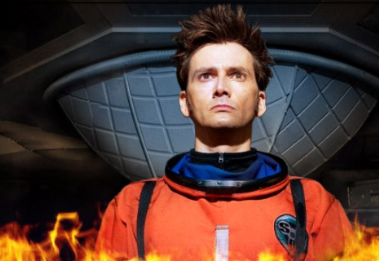
Ten: The Tenth Doctor is between
The Waters of Mars and
The End of Time. And the Waters of Mars ended with the Doctor declaring himself the winner of the Time War and that the laws of time would obey him. He didn't do this because he wanted the universe to do his bidding, but because he couldn't stand to watch any more people die because time said they must. He is moving beyond the Time War, escaping from the guilt and using his position as last of the time lords to save people, but is also declaring himself the winner ("Time Lord Victorious") who can control the laws of time. He can't really move on, and when he tries to, well, Adelaide Brooke still didn't survive, and he practically turns into the Master.
Eleven: The Eleventh Doctor has obviously just come back from The Name of the Doctor, because it's the previous episode. In that, he saw that there was no escaping from the Time War, and that he would continue to be a warrior until his death, when he would be burred in a battlefield graveyard.

And when Ten and Eleven meet, its interesting to see how much of their approach to each other is defined by how each of them has learned to cope with the guilt of the Time War. Ten is the hero, the man who regrets, the one who would do anything to become a good man. Eleven doesn't know who he is, the man who forgets, who is coming to the end of his life and isn't sure he's done more good for the universe than harm. Ten is furious that Eleven has forgotten, but Eleven says that he's moved on because he saw Trenzalore, where they're buried. He's seen the end, and he's realized that being the man who regrets will get him nowhere but a battlefield graveyard, so he's tried to forget. He's even tried to erase himself from the databanks of the universe, so that his reputation doesn't continue to turn him into the man, the mighty warrior, who makes whole armies turn and run at the mention of his name. And even that wasn't enough to stop him from dying still a warrior.
So at this juncture, these three Doctors meet, and they get along okay, sometimes fighting, sometimes joking, mirroring each other's movements, and generally being badass together. You get the idea that as much as the Doctor hates himself for burning Gallifrey, he's still vain enough to enjoy his own company and be impressed by his other selves.

And then comes the moment (pun intended) to end the Time War. The War Doctor has decided that it's worth becoming the man that he's met to save the universe, and is about to use the Moment before his other selves arrive.
Up until the point that the Moment lets the other two Doctors into that shed on Gallifrey (I assume it was on Gallifrey), the Doctor was headed in the direction that the War Doctor's choice to burn Gallifrey had taken him. Which is to Trenzalore.
But when Ten and Eleven arrive in that shed, everything changes. Still being the men that the War Doctor made them, they originally decide that they are going to help the War Doctor so that he does not do it alone.
(I swear I was crying at this point because I couldn't believe that the 50th Anniversary was actually going to end with the Doctor committing genocide, and I still find that to be one of the saddest moments in all of Doctor Who. And then there was this sudden relief when he decides not to and I'm like "That's awesome. Uh...where the hell is this going now?")

It's not the Doctor who changes his mind. The Doctor does not have that ability anymore. After the Time War, the Doctor's companions have to be the ones to stop him, to tell him to do the right thing, to remind him to be the Doctor. Because he can't do it by himself anymore. I don't believe this was the case before the Time War (in the Classic Series). Three's companions certainly weren't the ones being his moral compass; he was being theirs most of the time.
Clara changes the Doctor's mind. She literally tells him to be a Doctor. She reminds him of the promise that he made, which he tells her was "Never cruel or cowardly. Never give up, never give in." And the Doctor decides not to use the Moment.
 |
| Guess what's back? This pic! |

This is where the huge shift in the trilogy happens. The Doctor was set on a collision course with disaster for which he originally set at the end of the Last Great Time War. He was going to die in battle, a warrior to the last, because of the genocide he committed. There was to be no redemption, no moving on. How could there be? No one could ever really get over killing off their own species.
This changes everything; the whole timeline that was the Doctor's future is replaced with this new timeline in which the Doctor didn't destroy Gallifrey, but hid it away in a pocket universe.
 |
| Why can't we do both? |
[This is an issue with some people. There is a huge debate over whether the Doctor ever burned Gallifrey or whether he always saved it. I don't like arguing with people, so I say: both! Before the Day of the Doctor, the Doctor had burned Gallifrey. In every episode you watch up to Day of the Doctor, the Doctor actually killed off his own species. They're gone. In every episode you watching from Day of the Doctor on, the Doctor never actually destroyed Gallifrey. So in Time of the Doctor, he never burned Gallifrey in any timeline. But in Name of the Doctor, he did in every timeline. This allows people who think that Moffat has invalidated RTD's character development to go back and watch episodes with nothing changed; this also allows for Twelve to be totally free of any guilt for ending the Time War.]
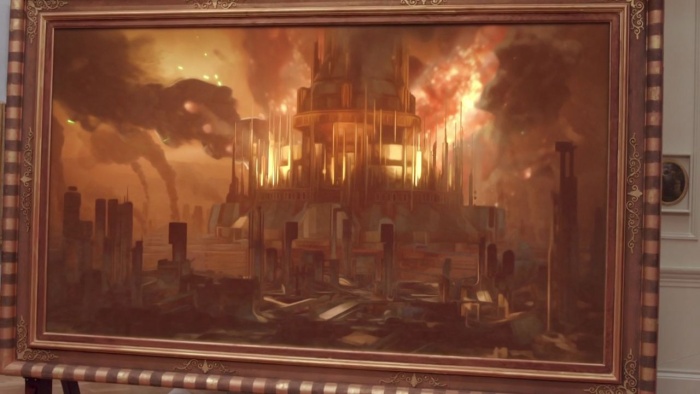
It's no accident that the Curator appears as a retired old Doctor in control of his regeneration after the Doctor decides to save Gallifrey. There was no future for the Doctor after Trenzalore before he saved Gallifrey; now there's a Curator to tell him "Gallifrey Falls No More."
And Ten says, "We need a new destination. Because I don't want to go." In this moment after the timeline has changed (and indeed, has was never any other way), the Doctor's whole life is no longer heading towards Trenzalore. Even the War Doctor and Ten have changed their direction.
The Time of the Doctor

The universe is a different place in
The Time of the Doctor. The Doctor arrives on Trenzalore to hear the Time Lords calling out of a crack in the wall. They were always calling; they were the ones who caused the whole Silence thing.
This is different from in The Name of the Doctor,where the Time Lords were decidedly dead and Trenzalore was a battlefield, where the Doctor died in a minor skirmish. It does seem to be implied that the Silence were dedicated to protecting time from the Great Intelligence and thus wanted silence to fall when he asked "Doctor Who?" in The Name of the Doctor.

Now, the Silence are dedicated to keeping the Time War from restarting by keeping the Doctor for answering the question coming through the crack from the Time Lords. And
it was always this way. Anything before
Day of the Doctor has the Time Lords dead and always dead. Anything after
Day of the Doctor has the Time Lords always alive and never been dead.

The Doctor, not able to stop either the Daleks or the Church of the Papal Mainframe, decides to simply stay and wait out the stalemate. He'll save every life that he can, because every life is a victory. Notice that he does this without any prompting from Clara, his companion. He sends her home. He stays, he helps. He isn't the man who keeps running and moving on, because he can't look back. He's the man who stayed for Christmas.
The Doctor has washed away the stains of the warrior. He has become, as he was in The Night of the Doctor before he started fighting in the Time War, the good man, the Doctor--and they are the same thing.

Look at the difference between
The Time of the Doctor and
The Name of the Doctor. In
Name, the Doctor has become this dark figure, the slaughterer of the ten billion, the Valeyard, Storm, the Beast, the cruel tyrant before he dies. In
Time, he becomes the great protector of a small town, a lovable grandfather figure to all the people. And all that, without a companion.

Look at Ten--he goes mad without a companion and declares ownership over the laws of time. Before
Day of the Doctor, the Eleven started killing people when he went too long without Amy and Rory, and he couldn't sit for a day in their sitting room without going crazy.
The Doctor has found peace, the peace that he always wanted. Remember his dream of growing old in Family of Blood? That's what Eleven gets to do.
After the End of the Doctor
So now the change is complete. The Doctor has washed away the warrior from his nature, he has found peace, and he is ready to die. Really, Time of the Doctor does wrap up the Doctor's whole story. He started running from Gallifrey as the First Doctor, made the promise, kept it until the Time War, where he broke it as the War Doctor, spent three incarnations trying to go back to keeping the promise but forever regretting and forgetting what breaking it had turned him into, undid breaking the promise as Eleven, and then stopped running and found a home where he could truly keep the promise. The story of the Doctor is truly the story of his journey from Gallifrey to Trenzalore.
"Raggedy man, goodnight." The story is over. It's time to say goodnight.
But with a new regeneration cycle, it's only the end of the chapter, and you have to wait until tomorrow to hear the next one.
"Kidneys! I've got new kidneys! I don't like the color. We're probably crashing. Stay calm. Just one question. Do you happen to know how to fly this thing?"
And what a wonderful chapter it will be.
